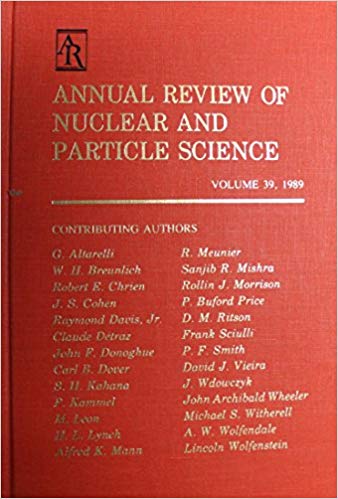中子星与核物质状态方程
IF 9.1
2区 物理与天体物理
Q1 PHYSICS, NUCLEAR
Annual Review of Nuclear and Particle Science
Pub Date : 2021-07-06
DOI:10.1146/ANNUREV-NUCL-102419-124827
引用次数: 55
摘要
中子星为研究致密核物质的特性提供了一个窗口。最近的一些观测和理论发展为它们的结构和内部组成提供了强有力的限制。其中包括首次观测到的双中子星合并GW170817,其引力辐射伴随着短γ射线爆发的电磁辐射和光学余辉,据信是由于新形成的重r过程核的放射性衰变。这些观测对典型中子星的半径和中子星最大质量的上限给出了重要的限制,并补充了最近脉冲星观测所建立的下限。中子星内部成分探测器(NICER) x射线望远镜的脉冲剖面观测提供了对中子星半径的独立、一致的测量。中子物质的理论多体研究加强了对中子星半径的这些估计。利用参数化稠密物质状态方程(EOSs)的研究揭示了若干与全局中子星性质无关的关系。预计《核与粒子科学年鉴》71卷的最终在线出版日期为2021年9月。修订后的估计数请参阅http://www.annualreviews.org/page/journal/pubdates。本文章由计算机程序翻译,如有差异,请以英文原文为准。
Neutron Stars and the Nuclear Matter Equation of State
Neutron stars provide a window into the properties of dense nuclear matter. Several recent observational and theoretical developments provide powerful constraints on their structure and internal composition. Among these are the first observed binary neutron star merger, GW170817, whose gravitational radiation was accompanied by electromagnetic radiation from a short γ-ray burst and an optical afterglow believed to be due to the radioactive decay of newly minted heavy r-process nuclei. These observations give important constraints on the radii of typical neutron stars and on the upper limit to the neutron star maximum mass and complement recent pulsar observations that established a lower limit. Pulse-profile observations by the Neutron Star Interior Composition Explorer (NICER) X-ray telescope provide an independent, consistent measure of the neutron star radius. Theoretical many-body studies of neutron matter reinforce these estimates of neutron star radii. Studies using parameterized dense matter equations of state (EOSs) reveal several EOS-independent relations connecting global neutron star properties. Expected final online publication date for the Annual Review of Nuclear and Particle Science, Volume 71 is September 2021. Please see http://www.annualreviews.org/page/journal/pubdates for revised estimates.
求助全文
通过发布文献求助,成功后即可免费获取论文全文。
去求助
来源期刊
CiteScore
21.50
自引率
0.80%
发文量
18
期刊介绍:
The Annual Review of Nuclear and Particle Science is a publication that has been available since 1952. It focuses on various aspects of nuclear and particle science, including both theoretical and experimental developments. The journal covers topics such as nuclear structure, heavy ion interactions, oscillations observed in solar and atmospheric neutrinos, the physics of heavy quarks, the impact of particle and nuclear physics on astroparticle physics, and recent advancements in accelerator design and instrumentation.
One significant recent change in the journal is the conversion of its current volume from gated to open access. This conversion was made possible through Annual Reviews' Subscribe to Open program. As a result, all articles published in the current volume are now freely available to the public under a CC BY license. This change allows for greater accessibility and dissemination of research in the field of nuclear and particle science.

 求助内容:
求助内容: 应助结果提醒方式:
应助结果提醒方式:


